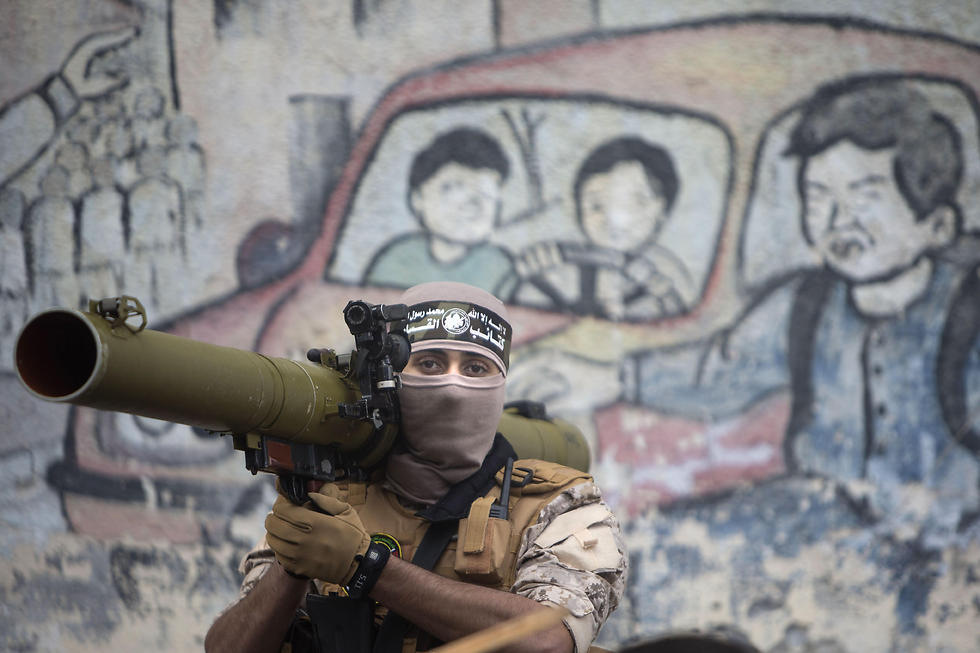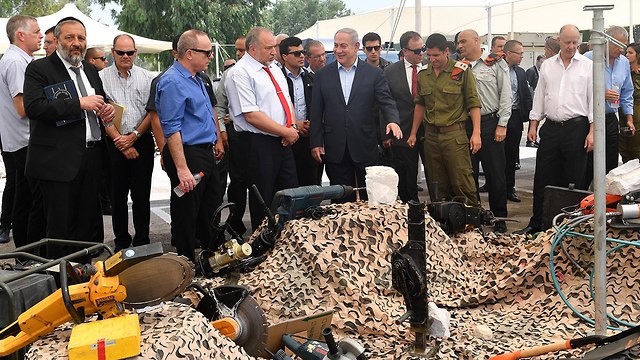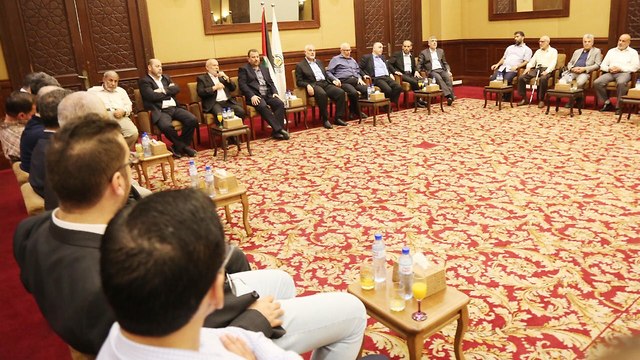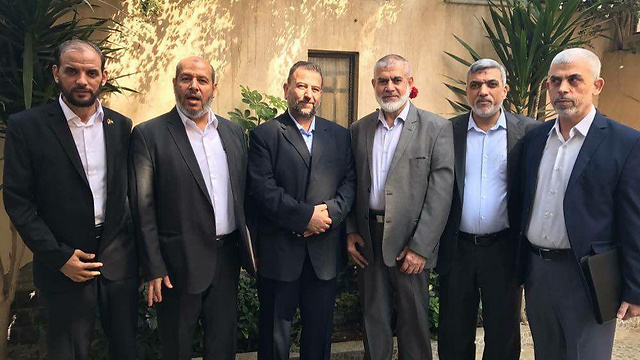

Hamas discusses battle-readiness in response to Israeli pessimism
Amid talks on a proposed ceasefire deal mediated by the UN and Egypt, Hamas leaders hold a meeting to discuss a possible military conflict with Israel, following the Israeli Security Cabinet statement Sunday that 'the IDF is prepared for any scenario.'
Hamas's political leadership met with the organization's military wing on Monday to discuss their battle readiness after the Israeli Security Cabinet concluded a meeting Sunday with the statement "the IDF is prepared for any scenario," Palestinian sources said.
Hamas leaked the information about the meeting, which was held in light of threats made against the "resistance" and against the Palestinians, the source said.
The same sources added that the heads of Hamas's military wing stressed that they could inflict heavy losses on Israel, which the Israeli government and public would not be able to withstand.
The Israeli Cabinet met on Sunday to discuss a proposed ceasefire agreement with Hamas mediated by the UN and Egypt.
During the meeting, IDF Chief of Staff Gadi Eisenkot briefed the ministers on the situation in the strip.
While the ministers discussed the plan, they made no decisions on the matter and were not asked to approve it.
Hamas's political officials were briefed on the organization's meeting, and no information was giving regarding the meeting's duration or starting time.
It should be noted that a senior Hamas delegation headed by the deputy leader of the organization, Saleh al-Arouri, who is responsible for several bloody terrorist attacks, arrived in Gaza last week to discuss the cease-fire arrangement proposed by Egypt and the UN.
Cabinet member Yoav Galant told Army Radio on Monday that any cease-fire deal would be limited in scope and added that the ministers discussed the reopening of the Kerem Shalom border crossing.
Yoav Galant's assessment appeared to fall short of what Hamas officials have described as Egyptian efforts to broker a comprehensive agreement, including a significant easing of an 11-year-old border blockade and UN-led reconstruction of Gaza.
But Galant said what is at issue is a ceasefire, not a full-scale agreement: "There is no process toward an agreement."
The difference in perceptions suggests chances for an agreement are slim.
Similarly, a member of the Israeli Security Cabinet, Ze'ev Elkin (Likud), said in an interview with Ynet on Mondat that "an arrangement with Hamas is currently not on the agenda."
Elkin added that "Hamas wants to go back in time, three months back, to a reality of calm and quiet in the Gaza Strip, we are willing to do that…Hamas understands that continuing this way will lead to Operation Protective Edge 2."
Addressing the humanitarian situation in the Gaza Strip, Elkin said that "Israel is not responsible for the humanitarian situation in Gaza, if Hamas wants to see want more gestures from us, they need to return the Israeli soldiers' remains."
Elkin also addressed Egypt's responsibility for the Gaza strip. "As far as we are concerned, after the State of Israel left Gaza, responsibility should not be imposed on us. Egypt is no less responsible," Elkin asserted.
Elkin's remarks could upset Cairo as it tries to avoid being drawn back into the Palestinian enclave while brokering truce talks between Israel and Hamas.
Some Egyptian officials say they would resist any attempt by Israel, or its US ally, to shift the responsibility for Gaza's humanitarian situation to Cairo.
When asked about Cairo's role in the truce talks Elkin replied: "We left Gaza. If someone strikes at us from Gaza, they will get hit back. Let the Arab world resolve the internal, humanitarian problem of the Gaza Strip. Why should we bear responsibility for this?"
Asked if Elkin's comments reflected Netanyahu government policy, an Israeli official close to the prime minister declined comment. There was no immediate response from Cairo.
But Egyptian officials have privately voiced worry about Israeli calls for them to be more involved in the Gaza Strip.
According to one Egyptian official, the Foreign Ministry in Cairo instructed its diplomats to emphasize that Egypt would not budge from its position that Israel is the country with exclusive, ultimate responsibility for Gaza.
An Egyptian official, who spoke to Reuters on condition of anonymity, summarized Cairo's message as: "We are willing to do what we can to calm down the situation in Gaza or work on Palestinian reconciliation. But we will not take over from Israel in Gaza. It's Israel's problem."
Israel's intelligence and Transportation Minister Israel Katz tweeted on Sunday that the ceasefire agreement should include "bringing Egyptian infrastructure, at sea and on land, to bear for the good for Gaza, under international supervision."
The Egyptian official said Cairo would not let its facilities or territory in the Sinai desert, bordering Gaza, be used to relieve Israel of keeping the Palestinian economy alive.
The White House said on June 21 that it had discussed with Egypt "the need to facilitate humanitarian relief to Gaza".
The Trump administration's stated position is that Gaza should be under the control of Hamas's Western-backed Palestinian rivals.
The proposed ceasefire plan, mediated by UN Special Coordinator for the Middle East Nickolay Mladenov and Egyptian intelligence, is the first stage in the effort to reach a broader agreement between Hamas and Israel.
But there was not much optimism among the ministers. The chances of reaching a broader, long-term agreement with Hamas were very low, since there are too many obstacles on the way and it is doubtful the gaps can be bridged.
Hamas demands the release of high value prisoners in return for advancing negotiations for the release of civilians and the return of IDF soldiers' remains.
Israel, meanwhile, objects to releasing high value prisoners, and conditions any broad agreement in a resolution to the issue of MIAs and POWs.
Reuters contributed to this report.



















